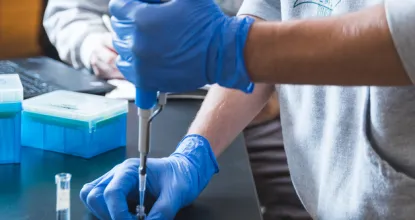Facilities and Equipment

The Seaborg Science Complex is made up of two buildings: The Science Building and Kathleen Shingler Weston Hall. The Glenn T. Seaborg Center in The Science Building is one of 33 designated mathematics/science centers in the State of Michigan. Weston Hall opened in 2000 and The Science Building was completely remodeled at that time.
The complex houses the School of Nursing and the Biology, Chemistry, Clinical Sciences, Earth, Environmental and Geographical Sciences, Physics and Speech, and Language and Hearing Sciences departments.
The complex is named for Glenn T. Seaborg, an Ishpeming native who discovered plutonium and 10 other elements. He was awarded the Nobel Prize for chemistry in 1951 (with co-discoverer Edwin McMillan) and the 1991 National Medal of Science.
Kathleen Shingler Weston was one of NMU's first female graduates (1929) who went on to complete a medical degree. She became part of the team that developed the Salk polio vaccine and was honored by President Lyndon B. Johnson as one of the nation's “Outstanding Medical Women.”
Teaching Labs
The Department of Chemistry has six dedicated teaching laboratories (approximately 7200 total square feet in total) located in Weston Hall. They are supported by an extensive stock room overseen by our Stockroom Supervisor and a team of student workers. These labs provide space and equipment for hands-on experiential learning in general chemistry, organic chemistry, analytical chemistry, inorganic chemistry, and physical chemistry. In addition, we share lab space with the Department of Biology that supports our courses in biochemistry.
Research Labs
The Department of Chemistry has five dedicated research laboratories (approximately 6000 total square feet in total) located in Weston Hall. These facilities support the research activities of faculty and undergraduate researchers. In addition, there are dedicated cold rooms and instrument facilities to support research and teaching.
Shimadzu Medicinal Plant Chemistry Facility
The medicinal plant facility located in The Science Building is the newest lab space in the chemistry department. It opened in the fall of 2019. The 4500 square foot facility was funded in part by Shimadzu Scientific Instruments and consists of a grow facility, a sample preparation lab, and a chromatography and mass spectrometry lab. The instrumentation lab houses an array of chromatography and mass spectrometry instrumentation. The facility is used by our medicinal plant chemistry students for their senior projects, instrumental analysis students, and forensic biochemistry students.
Equipment
Instrument |
Brand |
Model |
| Calorimetry Instruments | Brand | Model |
| Differential Scanning Calorimeter (DSC) | Mettler-Toledo. | DSC 3+ |
| Isothermal Titration Calorimeter | Microcal, Inc. | |
| Thermogravimetric analyzer/DSC | Netzsch | STA 409 PC |
| Molecular Spectroscopy Instruments | Brand | Model |
| FT-IR | Shimadzu | IRAffinity-1; ATR |
| UV-Vis scanning spec | Varian | Cary 100 Bio |
| UV-Vis Spec | Shimadzu | UV 160 |
| 400 MHz NMR | JEOL | ECZ 400S |
| 60 MHz FT NMR | Varian-Anasazi | |
| Atomic Spectroscopy Instruments | Brand | Model |
| ICP-MS | Shimadzu | 2030 |
| Microwave digester | Anton-Paar | Multiwave GO |
| Chromatography Instruments | Brand | Model |
| GC | Shimadzu | 2030; FID, headspace |
| GC | Shimadzu | GC 2010 Plus; FID, TCD |
| GC-MS | Shimadzu | QP 2020 NX, headspace |
| LC | Shimadzu | LC 2030C Plus; PDA, RID |
| LC | Perkin Elmer | Series 200; UV/Vis/Floresc. Detector |
| Mass Spectrometry Instruments | Brand | Model |
| LC-MS/MS | Shimadzu | LC/MS 8040 |
| LC-MS/MS | Shimadzu | LCMS 8045 |
| Bio Chemistry Instruments | Brand | Model |
| Digital Image Station | Kodak | |
| Micro-plate Reader | BioTek | 800 TS |
| Nanodrop | Thermo Scientific | NanoDrop One |
| Thermal Cycler | BioRad | T-100 |
| Trans-Blot Turbo Transfer System | BioRad | Trans-Blot Turbo Transfer System |
